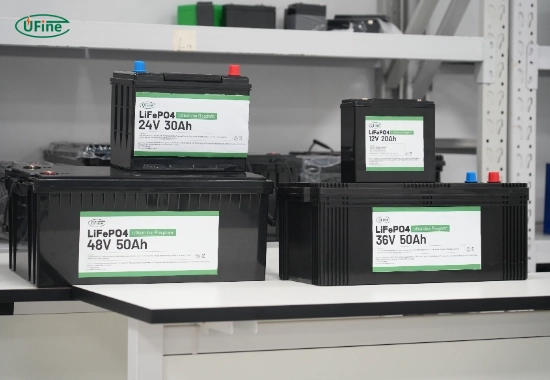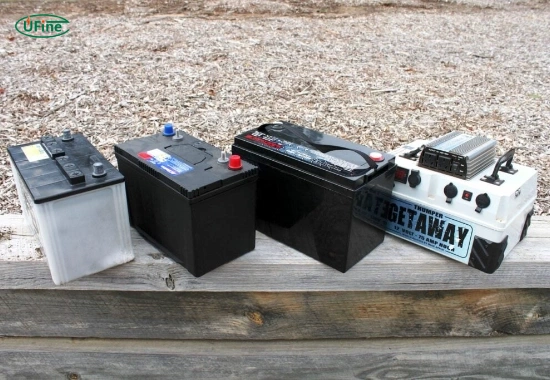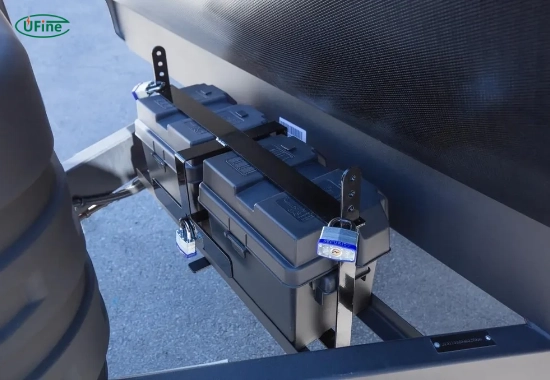Choosing the right battery for your travel trailer ensures a smooth and enjoyable camping experience. Whether you’re embarking on a weekend getaway or a long road trip, having a reliable power source can make all the difference. This comprehensive guide will explore the various types of batteries available, their features, and how to select the best one for your needs.
Part 1. What are travel trailer batteries?
Travel trailer batteries are essential components that power various electrical systems within the trailer. They are responsible for running lights, appliances, and other electrical devices when you’re off-grid or away from a power source. Understanding the different types of batteries and their functions is key to making an informed decision.
Travel trailer batteries come in various sizes and capacities. They can power everything from small lights to larger appliances like refrigerators and air conditioners. Knowing how much power you need will help you choose the right battery.
Part 2. Types of travel trailer batteries
When it comes to travel trailer batteries, there are three main types:
- Lead-Acid Batteries: These are the most common and affordable option. They come in two varieties: flooded and sealed (AGM). Flooded batteries require maintenance and venting, while AGM batteries need no maintenance and can mount in various positions. People widely use lead-acid batteries because they are heavier but more affordable.
- Lithium Batteries: Lithium batteries, known for their longevity and efficiency, offer a higher energy density and longer lifespan than lead-acid options. They are lightweight and can discharge more deeply without damage, making them ideal for extended trips. Although they have a higher initial cost, their long-term savings make them popular among serious travelers.
- Gel Batteries: These are a subtype of lead-acid batteries that use a gel electrolyte instead of a liquid. They are less prone to spillage and can handle deep discharges better than flooded lead-acid batteries. Gel batteries remain sealed, making them safer for use in confined spaces.
Part 3. Key features to consider for travel trailer batteries
When selecting a battery for your travel trailer, consider the following features:
- Capacity (Ah): Measured in amp-hours (Ah), this indicates how much energy the battery can store. Higher capacity means longer usage time before needing a recharge. For example, a 100Ah battery can provide 5 amps for 20 hours.
- Weight: The weight of the battery affects how much you can carry in your trailer. Lithium batteries are generally lighter than lead-acid options, which can help improve your trailer’s overall weight distribution.
- Lifespan: Look for batteries with longer lifespans (measured in cycles). Lithium batteries typically last longer than lead-acid batteries. With proper care, a good lithium battery may last up to 10 years or more, while lead-acid varieties often need replacement every few years.
- Temperature Tolerance: If you plan to camp in extreme weather conditions, choose a battery that can operate efficiently in high and low temperatures. Some lithium batteries perform better in cold weather compared to lead-acid options.
Part 4. How to determine your power needs for travel trailer batteries?
Before purchasing a battery, it’s essential to calculate your power needs:
- List Your Appliances: Identify all electrical devices you plan to use in your travel trailer.
- Calculate Power Consumption: Determine the wattage of each appliance and how long you will use it daily.
- Total Your Needs: Add the total watt-hours required daily. To convert this into amp-hours, use the formula: Amp-Hours = Watt-Hours / Battery Voltage
- Factor in Safety Margin: It’s wise to add a buffer (about 20%) to account for inefficiencies.
For example, if you plan to run a 60-watt light bulb for 5 hours, that would be:
- Watt-Hours = 60 watts * 5 hours = 300 watt-hours
If you’re using a 12V battery:
- Amp-Hours = 300 watt-hours / 12 volts = 25 amp-hours
Adding a safety margin:
- Total Amp-Hours = 25 amp-hours * 1.2 = 30 amp-hours
Top 10 Travel Trailer Battery Review 2024
Part 5. Installation tips for your travel trailer battery
Proper installation is vital for maximizing your battery’s performance:
- Choose the Right Location: Install the battery in a well-ventilated area away from extreme heat or cold. A dedicated battery compartment is ideal.
- Secure Connections: Ensure all connections are tight and corrosion-free to prevent power loss. Use anti-corrosion spray on terminals if necessary.
- Use Proper Cables: Use appropriately sized cables to handle the current load without overheating. Thicker cables reduce resistance and improve efficiency.
Part 6. Maintenance tips for travel trailer batteries to ensure longevity
To extend the life of your travel trailer battery, follow these maintenance tips:
- Regular Checks: Inspect battery terminals and connections regularly for corrosion or loose connections. Clean any corrosion with a mixture of baking soda and water.
- Charge Properly: Use an appropriate charger for your battery type to avoid overcharging or undercharging. Smart chargers automatically adjust charging rates based on battery condition.
- Store Correctly: If you plan to store your trailer for an extended period, disconnect the battery and store it in a cool, dry place. For lead-acid batteries, make sure to fully charge them before storing them.
Part 7. FAQs
-
What is the best type of battery for my travel trailer?
The best type depends on your usage patterns. Lithium batteries offer longevity and efficiency but are more expensive than lead-acid options. -
How often should I replace my travel trailer battery?
Typically, lead-acid batteries need replacement every few years, while lithium batteries can last up to ten years or more with proper care. -
Can I use my car battery in my travel trailer?
While you can technically use a car battery, experts do not recommend it because car batteries provide short bursts of power, not the sustained energy output needed by trailers. -
How do I know if my battery needs charging?
If you notice dimming lights or appliances not functioning correctly, it may be time to recharge your battery. Many modern lithium batteries have built-in monitoring systems that alert you when charging is needed. -
Is it better to have one large battery or multiple smaller ones?
This depends on your setup; multiple smaller batteries can offer flexibility in weight distribution and redundancy if one fails, while one large battery simplifies installation.
Related Tags:
More Articles

How to Choose the Best Floor Scrubber Battery for Commercial Cleaning?
Selecting the ideal floor scrubber battery ensures a long runtime, rapid charging, and minimal maintenance for efficient commercial cleaning operations.
Battery for Blower vs Battery for Leaf Vacuum: Which One Should You Choose?
Battery for blower vs leaf vacuum—learn the key differences in power, fit, and runtime to choose the right battery for your outdoor tool needs.
How to Choose the Right Battery for Blower?
Choosing the right blower battery? Consider voltage, capacity, chemistry & usage. This guide helps match the best battery for peak performance.
How to Choose the Best Insulated Battery Box for Lithium Batteries?
Choosing the Best Insulated Battery Box for Lithium Batteries? Discover key factors such as size, material, and safety for optimal protection and performance.
7 Critical Elements on a Lithium Battery Shipping Label
What must be on a lithium battery shipping label? Learn 7 key elements to ensure safety, legal compliance, and correct handling across all transport modes.






